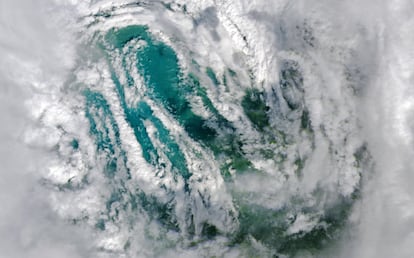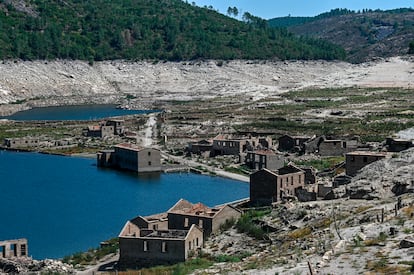From climate change denial to delayism: Oil firms send academics into the fray
Under the weight of evidence that environmental changes are no hoax, multinationals are turning to scholarly work to promote delay tactics - while keeping fossil fuels flowing

On April 8, 2021, José Francisco Contreras Peláez, a member of Spain’s lower house of parliament, spoke during a session of the parliamentary committee for Ecological Transition and Demographic Challenge. Contreras, a deputy representing the hard-right party Vox, was there to explain why his political group was the only one to have submitted an amendment to the Climate Change and Energy Transition bill, which was approved shortly thereafter.
In a deep, slow tone, Contreras argued that “the idea of a climate emergency” was a “paranoid theory that a large part of Western society has bought into without any scientific basis.” He did not refute the existence of global warming, but denied that it was an urgent matter. Then he delivered a speech synthesizing the main argumentative strategies of those seeking to obstruct the energy transition. His statements echoed the kind of “climate delayism” that is replacing outright denialism in global public forums.
“The State is not omniscient; it does not know which technologies at the end of the 21st century will be able to better reconcile economic sustainability with ecological sustainability,” said Contreras, evoking one of the main arguments of climate action delay tactics: that future scientific innovation, as yet undiscovered, will save us from the current degradation of the planet, and therefore we can continue burning fossil fuels and emitting greenhouse gases in the meantime.

Contreras listed a series of negative economic indicators (reduced growth, increased public debt) that he claimed would materialize if the European Union cut emissions. He did not, however, cite the billions of euros in global losses caused by wildfires, heatwaves, floods and droughts, among other extreme weather events whose intensity and frequency are being exacerbated by global warming, according to scientists.
The last sentence of his speech that day (”It is by no means the end of the world. However, you folks are acting as though this were an asteroid hurtling toward Earth to destroy it”) could have been inspired by Don’t Look Up, if it wasn’t for the fact that Contreras delivered these words seven months before the release of the movie, in which two scientists played by Leonardo DiCaprio and Jennifer Lawrence struggle to convince skeptical US authorities about the imminent impact of a giant meteorite.
Delay instead of deny
Climate delayism is “a systematic and coordinated strategy to bring about unwarranted concern regarding a wide range of climate actions for the purpose of slowing down or indefinitely suspending those actions,” writes John E. Fernandez, director of the Environmental Solutions Initiative at the Massachusetts Institute of Technology who participated in a White House roundtable on the issue in February. The goal of these delay tactics is “to keep us addicted to fossil fuels for as long as possible, allowing companies and those associated with them to continue to have great economic benefits, even if human civilization pays the price,” explains Michael E. Mann, a renowned climatologist who also participated in the White House meeting and is author of the book The New Climate War. The Fight to Take Back our Planet.

In Europe, climate skepticism or climate denial, the precursor to delayism, was always a marginal concept compared to its broad influence in the United States, where it had the support of several branches of the Republican Party. But the much more permeable rhetoric of postponement could now permeate socioeconomic classes affected by the ecological transition. Far-right parties like Vox in Spain or Giorgia Meloni’s Brothers of Italy could play a key role. A study published in 2021 by researchers at the University of Oxford found that “there is a link between the populist far right and climate skepticism.”
The current global context generated by inflation and the energy crisis, two pressing issues with great potential to relegate the fight against climate change to the background, is also contributing to this trend.
The academic William F. Lamb, of the Mercator Research Institute on Global Commons and Climate Change in Berlin, analyzed the foundations of the climate delay machinery by dissecting dozens of speeches by politicians and companies. In a study carried out with other researchers from the United Kingdom, Germany and the United States entitled Discourses of Climate Delay, scholars categorized the narrative strategies used to obstruct or postpone the fight against climate change into four large blocks: 1) arguments that deflect responsibility towards others (“China pollutes more than us,” “it is the citizen who must reduce gasoline consumption, not the companies that must stop extracting hydrocarbons”); 2) arguments that promote non-transformative solutions (technologies without enough evidence of their effectiveness or economic viability, such as carbon capture, which is very much in vogue); 3) arguments that emphasize the drawbacks of the energy transition (the economic cost, the loss of jobs); 4) those that evoke doom and gloom (“it is too late, nothing can be done now”). This last point is false, according to the latest assessment report from the IPCC, the United Nations panel of experts on climate change, which insists there is still room to stabilize temperature rises in the long term below 1.5 degrees Celsius compared to pre-industrial levels, one of the central objectives of the Paris Agreement.
By phone, Lamb explains that these strategies “are not new, but now they have gained more space in the media because denialism is on the decline.” He believes, like other academics consulted for this article, that delayism is a mutation of the denialist narrative, whose heyday dates back to the 1980s and 1990s, when the global environmental movement flourished and the first international agreements to reduce emissions were concluded, such as the Kyoto Protocol. Those speeches have been recalibrated to sound less radical and unscientific, but the fundamentals, objectives and strategies remain the same: preserve the interests of the fossil fuel sector.
Financing alternative theories
Leaks of corporate documents and academic studies on the origins of denialism have revealed that oil multinationals implemented a detailed plan to deny the existence of climate change when they perceived that their interests would be affected by the need to reduce emissions.
A 2016 Pulitzer Prize finalist investigation shed light on Exxon documents showing that the US oil company had known since the late 1970s that burning of fossil fuels caused climate change, and that this would have dire consequences for the planet. The company denied it for years through advertising campaigns.
But the pillar that sustained denial strategy was not the propaganda diffused by the oil companies. It was the production of apparently independent and qualified data and theories, but that in reality were partisan and lacking in scientific foundation, that called scientific findings into question. To that end, Exxon and other companies in the industry created or funded organizations that spread disinformation, a tactic that emulated strategies previously employed by the tobacco industry to counter medical studies that proved smoking caused lung cancer, according to a 2020 academic analysis.

“A prolific source of climate misinformation has been conservative think tanks and organizations focused on market deregulation. They have received many millions from fossil fuel companies,” John Cook, one of the leading experts in analyzing and combating climate propaganda, explains by email. These entities served the oil bosses, says Cook, to “broadly attack climate science, whether it was the scientific consensus, climate models or climate data, or the scientists themselves.”
Of all these objectives, the most important one was to neutralize the consensus of the world scientific community that global warming was taking place and that its origin lay in human activity (between 97% and 99% of academic studies today share these two premises). It was necessary to sow doubt and confuse public opinion in this regard, so that scientific findings on the roots of the problem, its urgency and possible solutions could be invalidated or, at the very least, questioned. Stripped of their factual value, scientific conclusions could be carried into the political and ideological arena.
In the US, where these techniques were most successful, organizations such as the billionaire Koch brothers’ Americans for Prosperity, as well as the Global Climate Coalition lobby group, propagated the denial discourse. Conservative media such as Fox News underpinned the strategy by getting the message across to voters with similar ideologies. The progressive press also contributed, probably unintentionally, to the campaign: the journalistic norm of ‘balanced reporting’ disproportionately represented deniers, write Riley Dunlap and Robert Brulle, two academics who have researched the amplifying elements of anti-climate change theories. Thus, note Dunlap and Brulle, “the false image was created that climate science was plagued by ‘controversy’ and therefore unreliable.”
Scholars from George Mason University and Cambridge who studied the workings of disinformation campaigns in 2018 showed that mentioning just a handful of false data is effective in reducing audience acceptance of climate change or its solutions. These days, massive social consumption of content produced by bloggers and social media commentators makes it more difficult to combat greenwashing campaigns, which are plagued by hoaxes and half-truths. “The rising trend now is misinformation about solutions to climate change,” explains Cook.
Sponsored scholars
Also participating in these disinformation campaigns are consultants, economists and even university professors who, in exchange for money, contribute a supposedly scientific veneer to the positions defended by the oil companies. In a book published in 2010, the scientific historians Naomi Oreskes and Erik Conway would describe those academics at the service of private interests as “merchants of doubt.”
Benjamin Franta, a senior researcher in climate litigation at the University of Oxford, is highly critical of the role of universities. “The fossil fuel industry continues to try to shape the scientific discussion towards positions that favor the sector, with arguments such as, for example, ‘we must investigate more before abandoning hydrocarbons’ or ‘we need biofuel and hydrogen’. The industry likes those solutions because they keep fossil fuels intact,” he says by phone from California.
A researcher on the history of climate misinformation, Franta recalls that student organizations at Harvard or Yale, to name just two, have pressured officials at these universities to stop accepting donations or funding for chairs from oil companies and their lobbies. It doesn’t always work.
“These universities are afraid of upsetting the industry, in part because they receive a lot of money from it,” says Franta. For him, this money is a way of “co-opting scientists” so that they will validate their arguments through university studies.
Tu suscripción se está usando en otro dispositivo
¿Quieres añadir otro usuario a tu suscripción?
Si continúas leyendo en este dispositivo, no se podrá leer en el otro.
FlechaTu suscripción se está usando en otro dispositivo y solo puedes acceder a EL PAÍS desde un dispositivo a la vez.
Si quieres compartir tu cuenta, cambia tu suscripción a la modalidad Premium, así podrás añadir otro usuario. Cada uno accederá con su propia cuenta de email, lo que os permitirá personalizar vuestra experiencia en EL PAÍS.
¿Tienes una suscripción de empresa? Accede aquí para contratar más cuentas.
En el caso de no saber quién está usando tu cuenta, te recomendamos cambiar tu contraseña aquí.
Si decides continuar compartiendo tu cuenta, este mensaje se mostrará en tu dispositivo y en el de la otra persona que está usando tu cuenta de forma indefinida, afectando a tu experiencia de lectura. Puedes consultar aquí los términos y condiciones de la suscripción digital.









































